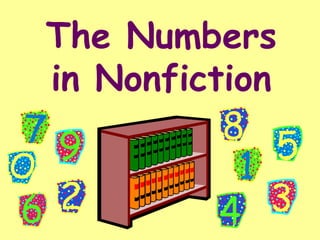Dewey decimal
- 2. Call Numbers âĒ As you recall in our last lesson, we learned about call numbers for fiction books. âĒ FIC at the top means that it is a fiction book. âĒ The bottom three letters are the first three letters for the authorâs last name.
- 3. âĒ These letters help us find a fiction book on the shelves. âĒ Nonfiction books are arranged in number order and work a little differently.
- 4. Now you are ready for Nonfiction Call Number Numbers at the top first three letters of the authorâs last name on the bottom
- 5. Example 629.228 First three letters of the authorâs last name Indicates a nonfiction book Ram
- 6. We have learned the recipe for making a nonfiction call number. numbers (for the subject) first three letters of the authorâs last name
- 7. Now letâs learn more about the numbers in a nonfiction call number.
- 8. How do we know what number goes with each subject ? By using something cool called The Dewey Decimal System !!
- 9. How do we know what number goes with each subject ? By using something cool called The Dewey Decimal System !!
- 10. The Dewey Decimal System is a tool used to sort books into groups or categories
- 11. This system was invented by a man named Melvil Dewey. He was a librarian who lived long ago.
- 12. Sorting books by subject, what a brilliant idea!! I think Iâve got it !!
- 13. 10 general groups for sorting all of the subjects General means broad, lots of subjects will fit into each group.
- 14. Here are the 10 general groups for sorting books in the Dewey Decimal System: General Works Philosophy Religion Social Studies Language Science Technology Arts and Leisure Literature History/Geography
- 15. This seems like a lot to remember, but donât worry youâll learn it all quickly. So letâs get going !!!!
- 16. 000s-General Works Books that fit in this group have many different subjects in them. Like: Encyclopedias or The Guinness Book of Records This is also where books on unexplained subjects would be found-like The Loch Ness Monster.
- 17. 100s-Philosophy Books that fit in this group tell about how we think and feel.
- 18. 200s-Religion Books in this group tell about different religions or stories from the bible.
- 19. 300s-Social Studies Books in this group tell about how people live together. holidays and customs government, military
- 20. Fairy tales and folk tales are also placed in the 300s. Many were written to teach a lesson about behavior and.. Thatâs social studies.
- 21. 400s-Language Books in this group are about different languages or grammar. noun verb adjective
- 22. 500s-Science Books in this group are about things from nature.
- 23. 600s-Technology This group has books that are about man-made things.
- 24. 700s-Arts and Leisure Books in this group are about things we do for fun.
- 25. 800s-Literature Books in this group are stories, jokes, plays, or poetry. This is the group fiction books were put in long ago when The Dewey Decimal System was first invented.
- 26. Today we have too many fiction books in our libraries to organize them in this way, so fiction books have their own way of being organized. You know, in ABC order, by author !
- 27. 900s- History/Geography Books in this group tell about events of the past and countries of the world.
- 28. Biography- 92 Donât forget this group. It contains books about famous peopleâs lives.
- 29. Knowing these big groups will help make it easier to find the books you want in the nonfiction section.
- 30. Remember, nonfiction call numbers are placed in number order first, so that means all of the books about the same subject end up near each other on the shelf. Thatâs Smart !!!!
- 31. Letâs See What Youâve Learned Call numbers help us find the books we want to read !!!
- 32. 1. What is the recipe for a nonfiction call number? Numbers (for the subject) First three letters in the authorâs last name
- 33. 2. What system tells us what numbers go with each subject? Dewey Decimal System
- 34. 3. Who is responsible for inventing the Dewey Decimal System? Melvil Dewey
- 35. 4. Mr. Dewey matched a number with each _____________. a) author b) subject c) title
- 36. 5. All school libraries use the Dewey Decimal System. a) false b) true
Editor's Notes
- In Melvilâs day there was no set way for library books to be organized. This made it hard for people to find the books they wanted, so Melvil started thinking and came up with a brilliant idea!!
- He decided it would make it easier to find books if they were grouped by subject, so first he came up with 10 general groups to use for sorting all subjects.
- Today we have too many fiction books in our libraries to organize them in this way, so fiction books have their own way of being organized.




































